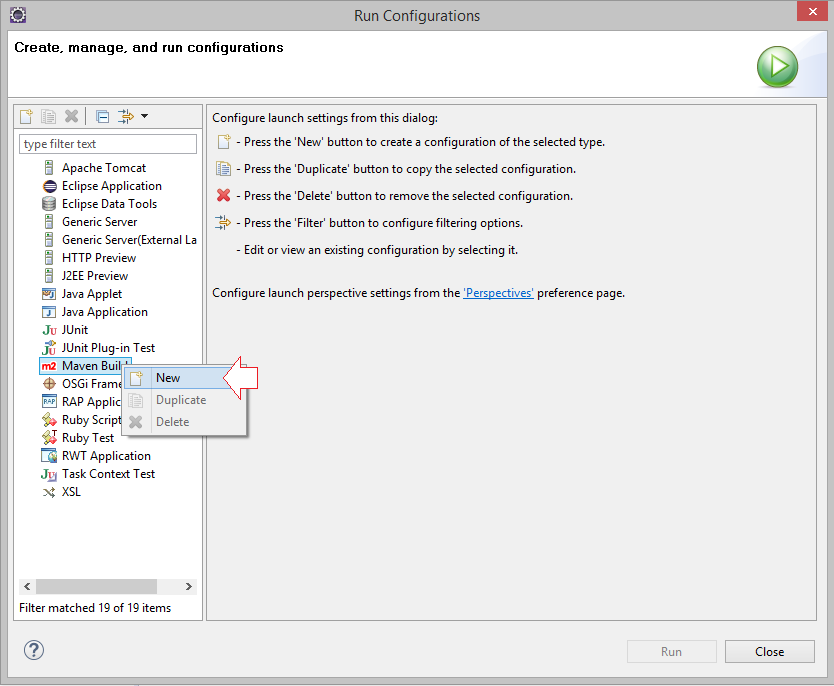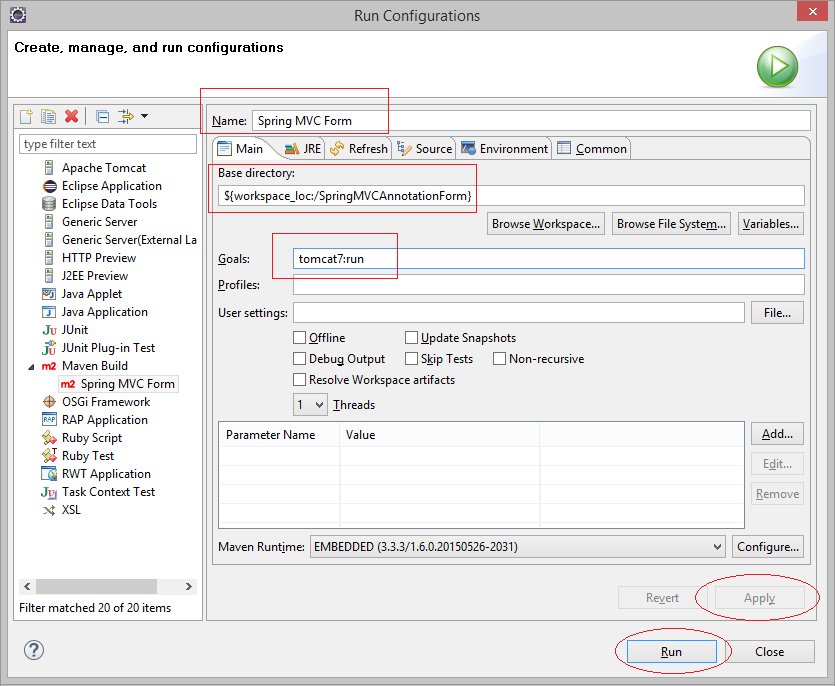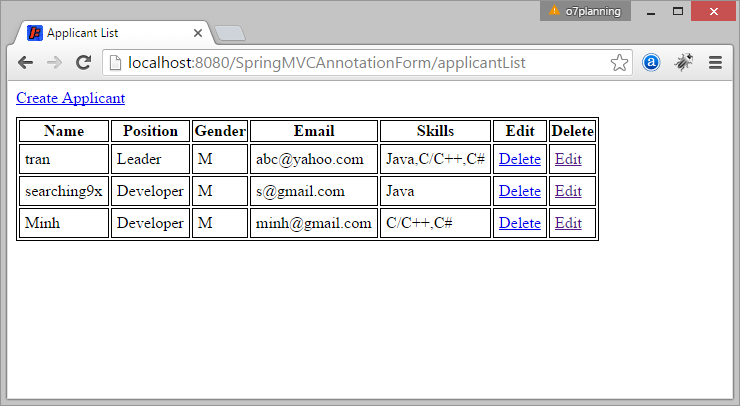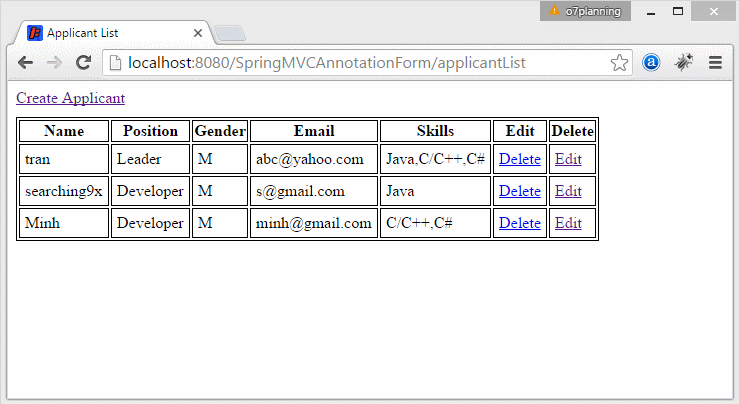Spring MVC Form Handling and Hibernate Tutorial with Examples
1. Introduction
This document is based on:
Spring MVC 4.2.5
Hibernate 5.x
Database: Oracle, MySQL, SQL Server
Preview example:
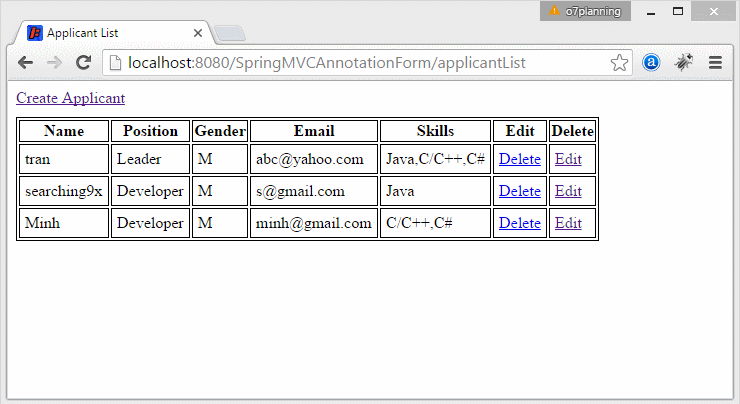
2. Prepare database
ORACLE
-- Create table
create table APPLICANTS
(
ID VARCHAR2(50) not null,
GENDER VARCHAR2(10) not null,
NAME VARCHAR2(50) not null,
POSITION VARCHAR2(50) not null,
SKILLS VARCHAR2(255) not null,
EMAIL VARCHAR2(50) not null
) ;
alter table APPLICANTS
add constraint APPLICANT_PK primary key (ID);MYSQL & SQL SERVER
-- Create table
create table APPLICANTS
(
ID VARCHAR(50) not null,
GENDER VARCHAR(10) not null,
NAME VARCHAR(50) not null,
POSITION VARCHAR(50) not null,
SKILLS VARCHAR(255) not null,
EMAIL VARCHAR(50) not null,
primary key (ID)
) ;3. Create Project
In Eclipse select:
- File/New/Others..
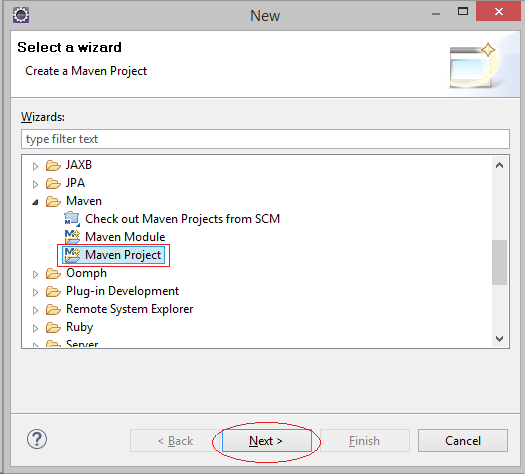
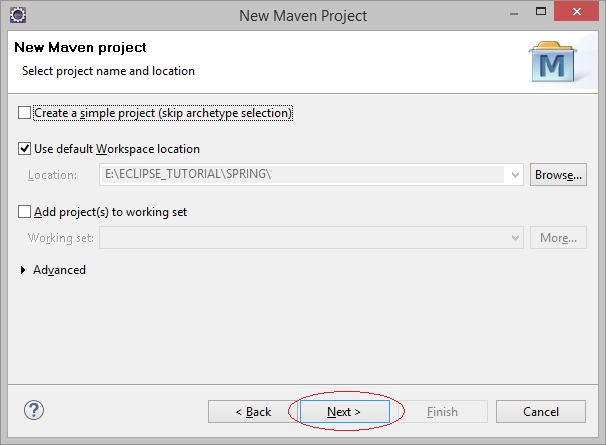
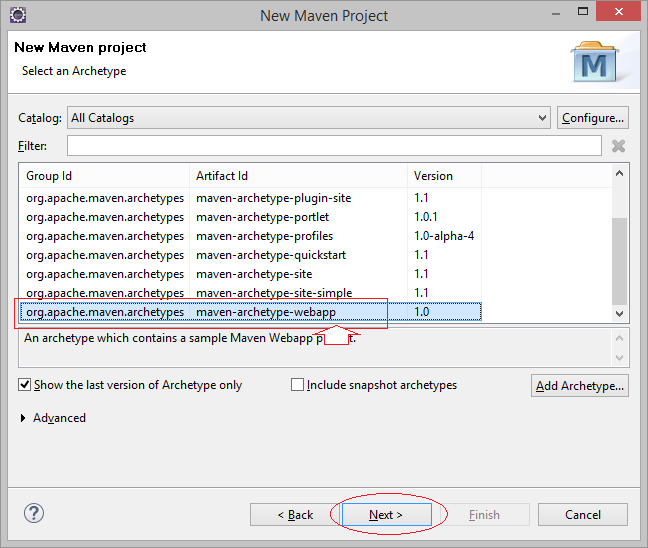
- Group Id: org.o7planning
- Artifact Id: SpringMVCAnnotationForm
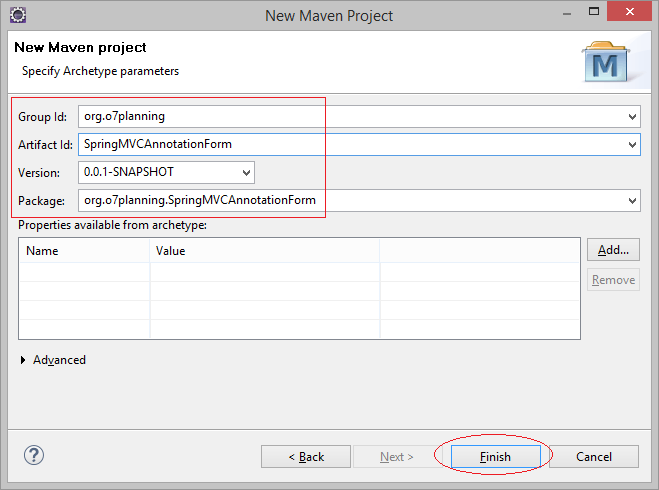
Project is created.
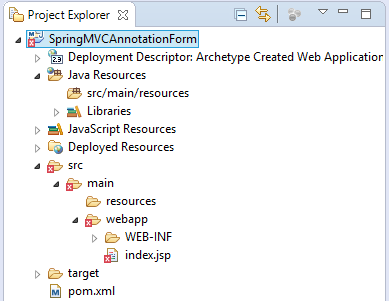
Fix Project:
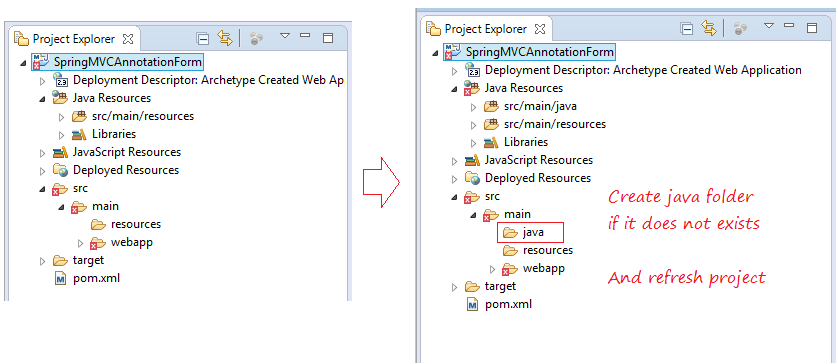
Right click Project, select Properties.
Select Java Compiler 7 or 8:
Select Java Compiler 7 or 8:
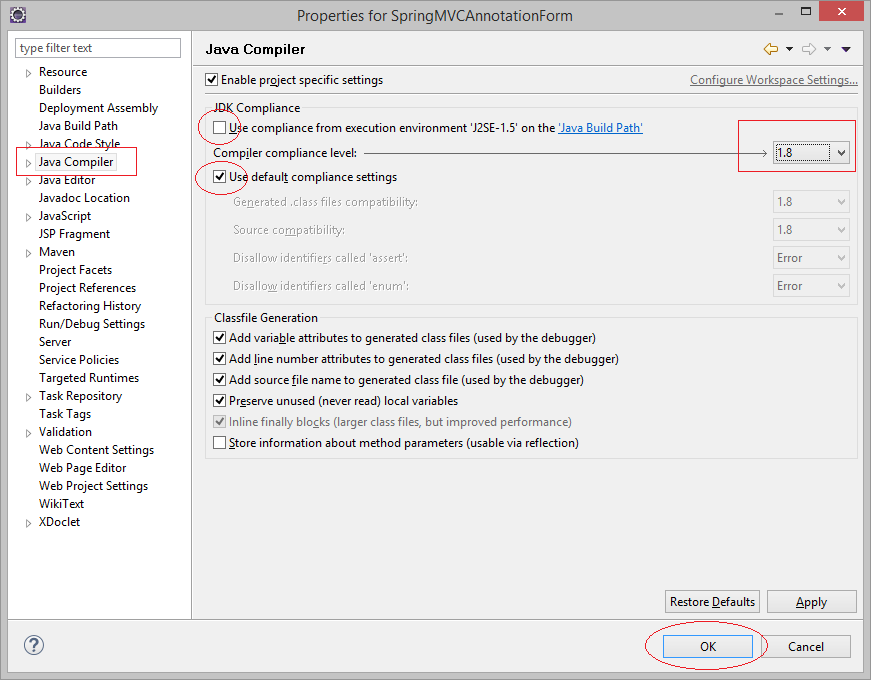
4. Configure Web.xml & Maven
You need to edit web.xml to use Servlet 3.x
web.xml
<?xml version="1.0" encoding="UTF-8"?>
<web-app xmlns:xsi="http://www.w3.org/2001/XMLSchema-instance"
xmlns="http://java.sun.com/xml/ns/javaee"
xsi:schemaLocation="http://java.sun.com/xml/ns/javaee http://java.sun.com/xml/ns/javaee/web-app_3_0.xsd"
id="WebApp_ID" version="3.0">
<display-name>Spring MVC Form</display-name>
</web-app>Configure Maven:
pom.xml
<project xmlns="http://maven.apache.org/POM/4.0.0"
xmlns:xsi="http://www.w3.org/2001/XMLSchema-instance"
xsi:schemaLocation="http://maven.apache.org/POM/4.0.0
http://maven.apache.org/maven-v4_0_0.xsd">
<modelVersion>4.0.0</modelVersion>
<groupId>org.o7planning</groupId>
<artifactId>SpringMVCAnnotationForm</artifactId>
<packaging>war</packaging>
<version>1.0.0</version>
<name>SpringMVCAnnotationForm Maven Webapp</name>
<url>http://maven.apache.org</url>
<properties>
<java-version>1.7</java-version>
</properties>
<repositories>
<!-- Repository for ORACLE JDBC Driver -->
<repository>
<id>codelds</id>
<url>https://code.lds.org/nexus/content/groups/main-repo</url>
</repository>
</repositories>
<dependencies>
<dependency>
<groupId>junit</groupId>
<artifactId>junit</artifactId>
<version>3.8.1</version>
<scope>test</scope>
</dependency>
<!-- Servlet API -->
<!-- http://mvnrepository.com/artifact/javax.servlet/javax.servlet-api -->
<dependency>
<groupId>javax.servlet</groupId>
<artifactId>javax.servlet-api</artifactId>
<version>3.1.0</version>
<scope>provided</scope>
</dependency>
<!-- Jstl for jsp page -->
<!-- http://mvnrepository.com/artifact/javax.servlet/jstl -->
<dependency>
<groupId>javax.servlet</groupId>
<artifactId>jstl</artifactId>
<version>1.2</version>
</dependency>
<!-- JSP API -->
<!-- http://mvnrepository.com/artifact/javax.servlet.jsp/jsp-api -->
<dependency>
<groupId>javax.servlet.jsp</groupId>
<artifactId>jsp-api</artifactId>
<version>2.2</version>
<scope>provided</scope>
</dependency>
<!-- Spring dependencies -->
<!-- http://mvnrepository.com/artifact/org.springframework/spring-core -->
<dependency>
<groupId>org.springframework</groupId>
<artifactId>spring-core</artifactId>
<version>4.2.5.RELEASE</version>
</dependency>
<!-- http://mvnrepository.com/artifact/org.springframework/spring-web -->
<dependency>
<groupId>org.springframework</groupId>
<artifactId>spring-web</artifactId>
<version>4.2.5.RELEASE</version>
</dependency>
<!-- http://mvnrepository.com/artifact/org.springframework/spring-webmvc -->
<dependency>
<groupId>org.springframework</groupId>
<artifactId>spring-webmvc</artifactId>
<version>4.2.5.RELEASE</version>
</dependency>
<!-- http://mvnrepository.com/artifact/org.springframework/spring-orm -->
<dependency>
<groupId>org.springframework</groupId>
<artifactId>spring-orm</artifactId>
<version>4.2.5.RELEASE</version>
</dependency>
<!-- Hibernate -->
<!-- http://mvnrepository.com/artifact/org.hibernate/hibernate-core -->
<dependency>
<groupId>org.hibernate</groupId>
<artifactId>hibernate-core</artifactId>
<version>5.1.0.Final</version>
</dependency>
<!-- http://mvnrepository.com/artifact/org.hibernate/hibernate-entitymanager -->
<dependency>
<groupId>org.hibernate</groupId>
<artifactId>hibernate-entitymanager</artifactId>
<version>5.1.0.Final</version>
</dependency>
<!-- http://mvnrepository.com/artifact/org.hibernate/hibernate-c3p0 -->
<dependency>
<groupId>org.hibernate</groupId>
<artifactId>hibernate-c3p0</artifactId>
<version>5.1.0.Final</version>
</dependency>
<!-- MySQL JDBC driver -->
<!-- http://mvnrepository.com/artifact/mysql/mysql-connector-java -->
<dependency>
<groupId>mysql</groupId>
<artifactId>mysql-connector-java</artifactId>
<version>5.1.34</version>
</dependency>
<!-- Oracle JDBC driver -->
<dependency>
<groupId>com.oracle</groupId>
<artifactId>ojdbc6</artifactId>
<version>11.2.0.3</version>
</dependency>
<!-- SQLServer JDBC driver (JTDS) -->
<!-- http://mvnrepository.com/artifact/net.sourceforge.jtds/jtds -->
<dependency>
<groupId>net.sourceforge.jtds</groupId>
<artifactId>jtds</artifactId>
<version>1.3.1</version>
</dependency>
<!-- Email validator,... -->
<!-- http://mvnrepository.com/artifact/commons-validator/commons-validator -->
<dependency>
<groupId>commons-validator</groupId>
<artifactId>commons-validator</artifactId>
<version>1.5.0</version>
</dependency>
</dependencies>
<build>
<finalName>SpringMVCAnnotationForm</finalName>
<plugins>
<!-- Config: Maven Tomcat Plugin -->
<!-- http://mvnrepository.com/artifact/org.apache.tomcat.maven/tomcat7-maven-plugin -->
<plugin>
<groupId>org.apache.tomcat.maven</groupId>
<artifactId>tomcat7-maven-plugin</artifactId>
<version>2.2</version>
<!-- Config: contextPath and Port (Default - /SpringMVCAnnotationForm : 8080) -->
<!--
<configuration>
<path>/</path>
<port>8899</port>
</configuration>
-->
</plugin>
</plugins>
</build>
</project>5. Configure Spring MVC
SpringWebAppInitializer used to initialize the Spring configuration, it is starting point of Spring MVC. It replaces the Spring MVC configuration in web.xml.** web.xml **<!-- With SpringWebAppInitializer, you do not need to configure in web.xml --> <servlet> <servlet-name>spring-mvc</servlet-name> <servlet-class> org.springframework.web.servlet.DispatcherServlet </servlet-class> <load-on-startup>1</load-on-startup> </servlet> <servlet-mapping> <servlet-name>spring-mvc</servlet-name> <url-pattern>/</url-pattern> </servlet-mapping>
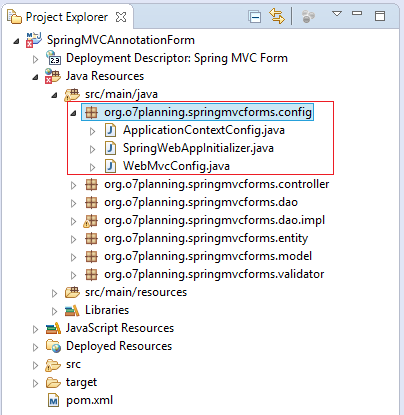
SpringWebAppInitializer.java
package org.o7planning.springmvcforms.config;
import javax.servlet.ServletContext;
import javax.servlet.ServletException;
import javax.servlet.ServletRegistration;
import org.springframework.web.WebApplicationInitializer;
import org.springframework.web.context.support.AnnotationConfigWebApplicationContext;
import org.springframework.web.servlet.DispatcherServlet;
public class SpringWebAppInitializer implements WebApplicationInitializer {
@Override
public void onStartup(ServletContext servletContext) throws ServletException {
AnnotationConfigWebApplicationContext appContext = new AnnotationConfigWebApplicationContext();
appContext.register(ApplicationContextConfig.class);
ServletRegistration.Dynamic dispatcher = servletContext.addServlet("SpringDispatcher",
new DispatcherServlet(appContext));
dispatcher.setLoadOnStartup(1);
dispatcher.addMapping("/");
}
}ApplicationContextConfig class used to configure Spring MVC Context, including:
- View Resolver
- Datasouce
- Hiberante (Hibernate Transaction Manager, Hibernate Session,..)
- DAO
- Bean
- ....
ApplicationContextConfig.java
package org.o7planning.springmvcforms.config;
import java.util.Properties;
import javax.sql.DataSource;
import org.hibernate.SessionFactory;
import org.o7planning.springmvcforms.dao.ApplicantDAO;
import org.o7planning.springmvcforms.dao.impl.ApplicantDAOImpl;
import org.springframework.beans.factory.annotation.Autowired;
import org.springframework.context.annotation.Bean;
import org.springframework.context.annotation.ComponentScan;
import org.springframework.context.annotation.Configuration;
import org.springframework.context.annotation.PropertySource;
import org.springframework.context.support.ResourceBundleMessageSource;
import org.springframework.core.env.Environment;
import org.springframework.jdbc.datasource.DriverManagerDataSource;
import org.springframework.orm.hibernate5.HibernateTransactionManager;
import org.springframework.orm.hibernate5.LocalSessionFactoryBean;
import org.springframework.transaction.annotation.EnableTransactionManagement;
import org.springframework.web.servlet.view.InternalResourceViewResolver;
@Configuration
@ComponentScan("org.o7planning.springmvcforms.*")
@EnableTransactionManagement
// Load to Environment.
@PropertySource("classpath:ds-hibernate-cfg.properties")
public class ApplicationContextConfig {
// The Environment class serves as the property holder
// and stores all the properties loaded by the @PropertySource
@Autowired
private Environment env;
@Bean
public ResourceBundleMessageSource messageSource() {
ResourceBundleMessageSource rb = new ResourceBundleMessageSource();
// Load property in message/validator.properties
rb.setBasenames(new String[] { "messages/validator"});
return rb;
}
@Bean(name = "viewResolver")
public InternalResourceViewResolver getViewResolver() {
InternalResourceViewResolver viewResolver = new InternalResourceViewResolver();
viewResolver.setPrefix("/WEB-INF/pages/");
viewResolver.setSuffix(".jsp");
return viewResolver;
}
@Bean(name = "dataSource")
public DataSource getDataSource() {
DriverManagerDataSource dataSource = new DriverManagerDataSource();
dataSource.setDriverClassName(env.getProperty("ds.database-driver"));
dataSource.setUrl(env.getProperty("ds.url"));
dataSource.setUsername(env.getProperty("ds.username"));
dataSource.setPassword(env.getProperty("ds.password"));
return dataSource;
}
@Autowired
@Bean(name = "sessionFactory")
public SessionFactory getSessionFactory(DataSource dataSource) throws Exception {
Properties properties = new Properties();
// See: ds-hibernate-cfg.properties
properties.put("hibernate.dialect", env.getProperty("hibernate.dialect"));
properties.put("hibernate.show_sql", env.getProperty("hibernate.show_sql"));
properties.put("current_session_context_class", env.getProperty("current_session_context_class"));
LocalSessionFactoryBean factoryBean = new LocalSessionFactoryBean();
factoryBean.setPackagesToScan(new String[] { "org.o7planning.springmvcforms.entity" });
factoryBean.setDataSource(dataSource);
factoryBean.setHibernateProperties(properties);
factoryBean.afterPropertiesSet();
//
SessionFactory sf = factoryBean.getObject();
return sf;
}
@Autowired
@Bean(name = "transactionManager")
public HibernateTransactionManager getTransactionManager(SessionFactory sessionFactory) {
HibernateTransactionManager transactionManager = new HibernateTransactionManager(sessionFactory);
return transactionManager;
}
@Bean(name = "applicantDAO")
public ApplicantDAO getApplicantDAO() {
return new ApplicantDAOImpl();
}
}ApplicationContextConfig will read the Datasource configuration information, Hibernate properties in ds-hibernate-cfg.properties file.
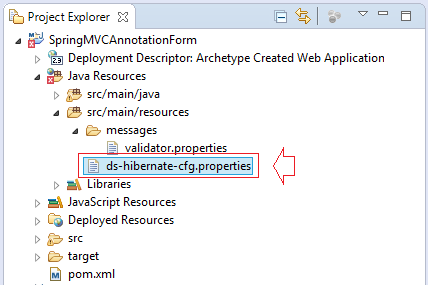
Configurations for Oracle, MySQL or SQL Server:
ds-hibernate-cfg.properties (For ORACLE)
# DataSource
ds.database-driver=oracle.jdbc.driver.OracleDriver
ds.url=jdbc:oracle:thin:@localhost:1521:db12c
ds.username=shoppingcart
ds.password=12345
# Hibernate Config
hibernate.dialect=org.hibernate.dialect.Oracle10gDialect
hibernate.show_sql=true
current_session_context_class=threadds-hibernate-cfg.properties (For MYSQL)
# DataSource
ds.database-driver=com.mysql.jdbc.Driver
ds.url=jdbc:mysql://localhost:3306/mydatabase
ds.username=root
ds.password=12345
# Hibernate Config
hibernate.dialect=org.hibernate.dialect.MySQLDialect
hibernate.show_sql=true
current_session_context_class=threadds-hibernate-cfg.properties (For SQL SERVER)
# DataSource
ds.database-driver=net.sourceforge.jtds.jdbc.Driver
ds.url=jdbc:jtds:sqlserver://localhost:1433/simplehr;instance=SQLEXPRESS
ds.username=shoppingcart
ds.password=12345
# Hibernate Config
hibernate.dialect=org.hibernate.dialect.SQLServerDialect
hibernate.show_sql=true
current_session_context_class=threadConfig for static resource (html, image, css,..)
WebMvcConfig.java
package org.o7planning.springmvcforms.config;
import org.springframework.context.annotation.Configuration;
import org.springframework.web.servlet.config.annotation.DefaultServletHandlerConfigurer;
import org.springframework.web.servlet.config.annotation.EnableWebMvc;
import org.springframework.web.servlet.config.annotation.ResourceHandlerRegistry;
import org.springframework.web.servlet.config.annotation.WebMvcConfigurerAdapter;
@Configuration
@EnableWebMvc
public class WebMvcConfig extends WebMvcConfigurerAdapter {
// Static Resource Config
// equivalents for <mvc:resources/> tags
@Override
public void addResourceHandlers(ResourceHandlerRegistry registry) {
registry.addResourceHandler("/css/**").addResourceLocations("/css/").setCachePeriod(31556926);
registry.addResourceHandler("/img/**").addResourceLocations("/img/").setCachePeriod(31556926);
registry.addResourceHandler("/js/**").addResourceLocations("/js/").setCachePeriod(31556926);
}
// equivalent for <mvc:default-servlet-handler/> tag
@Override
public void configureDefaultServletHandling(DefaultServletHandlerConfigurer configurer) {
configurer.enable();
}
}6. Classes participated in the example
Applicant is an entity class, simulation 'APPLICANTS' table in the database
Applicant.java
package org.o7planning.springmvcforms.entity;
import java.io.Serializable;
import javax.persistence.Column;
import javax.persistence.Entity;
import javax.persistence.Id;
import javax.persistence.Table;
@Entity
@Table(name = "Applicants")
public class Applicant implements Serializable {
private static final long serialVersionUID = -7893237204476214050L;
private String id;
private String name;
private String email;
private String position;
private String gender;
private String skills;
@Id
@Column(name = "ID", length = 50, nullable = false)
public String getId() {
return id;
}
public void setId(String id) {
this.id = id;
}
@Column(name = "Name", length = 50, nullable = false)
public String getName() {
return name;
}
public void setName(String name) {
this.name = name;
}
@Column(name = "Position", length = 50, nullable = false)
public String getPosition() {
return position;
}
public void setPosition(String position) {
this.position = position;
}
@Column(name = "Gender", length = 10, nullable = false)
public String getGender() {
return gender;
}
public void setGender(String gender) {
this.gender = gender;
}
@Column(name = "Email", length = 50, nullable = false)
public String getEmail() {
return email;
}
public void setEmail(String email) {
this.email = email;
}
@Column(name = "Skills", length = 255, nullable = false)
public String getSkills() {
return skills;
}
public void setSkills(String skills) {
this.skills = skills;
}
}ApplicantInfo.java
package org.o7planning.springmvcforms.model;
public class ApplicantInfo {
private String id;
private String name;
private String email;
private String position;
private String gender;
private String skillsString;
private String[] skills;
public ApplicantInfo() {
}
// Do not change this constructor,
// it is used in the Hibernate Query
public ApplicantInfo(String id, String name, String email, String gender, String position, String skillsString) {
this.id = id;
this.name = name;
this.email = email;
this.position = position;
this.gender = gender;
this.skillsString = skillsString;
this.skills = toArray(skillsString);
}
private String[] toArray(String skillStrings) {
if (skillStrings == null) {
return new String[0];
}
String[] ret = skillStrings.split(",");
return ret;
}
public String getId() {
return id;
}
public void setId(String id) {
this.id = id;
}
public String getName() {
return name;
}
public void setName(String name) {
this.name = name;
}
public String getEmail() {
return email;
}
public void setEmail(String email) {
this.email = email;
}
public String getPosition() {
return position;
}
public void setPosition(String position) {
this.position = position;
}
public String getGender() {
return gender;
}
public void setGender(String gender) {
this.gender = gender;
}
public String[] getSkills() {
return skills;
}
public void setSkills(String[] skills) {
this.skills = skills;
this.skillsString = this.joinString(skills);
}
private String joinString(String[] skills) {
if (skills == null) {
return "";
}
return String.join(",", skills);
}
public String getSkillsString() {
return this.skillsString;
}
}ApplicantDAO is a Spring Bean, to handle the insert, update, query data in the APPLICANTS table.
ApplicantDAO.java
package org.o7planning.springmvcforms.dao;
import java.util.List;
import org.o7planning.springmvcforms.entity.Applicant;
import org.o7planning.springmvcforms.model.ApplicantInfo;
public interface ApplicantDAO {
public Applicant findApplicant(String id);
public List<ApplicantInfo> listApplicantInfos();
public void saveApplicant(ApplicantInfo applicantInfo);
public ApplicantInfo findApplicantInfo(String id);
public void deleteApplicant(String id);
}ApplicantDAOImpl.java
package org.o7planning.springmvcforms.dao.impl;
import java.util.List;
import java.util.UUID;
import org.hibernate.Criteria;
import org.hibernate.Query;
import org.hibernate.Session;
import org.hibernate.SessionFactory;
import org.hibernate.criterion.Restrictions;
import org.o7planning.springmvcforms.dao.ApplicantDAO;
import org.o7planning.springmvcforms.entity.Applicant;
import org.o7planning.springmvcforms.model.ApplicantInfo;
import org.springframework.beans.factory.annotation.Autowired;
public class ApplicantDAOImpl implements ApplicantDAO {
@Autowired
private SessionFactory sessionFactory;
@Override
public Applicant findApplicant(String id) {
Session session = sessionFactory.getCurrentSession();
Criteria crit = session.createCriteria(Applicant.class);
crit.add(Restrictions.eq("id", id));
return (Applicant) crit.uniqueResult();
}
@Override
public ApplicantInfo findApplicantInfo(String id) {
Applicant applicant = this.findApplicant(id);
if (applicant == null) {
return null;
}
return new ApplicantInfo(applicant.getId(), applicant.getName(), //
applicant.getEmail(), applicant.getGender(), //
applicant.getPosition(), applicant.getSkills());
}
@Override
public List<ApplicantInfo> listApplicantInfos() {
String sql = "Select new " + ApplicantInfo.class.getName()//
+ "(a.id, a.name, a.email, a.gender, a.position, a.skills) "//
+ " from " + Applicant.class.getName() + " a ";
Session session = sessionFactory.getCurrentSession();
Query query = session.createQuery(sql);
return query.list();
}
public void saveApplicant(ApplicantInfo applicantInfo) {
String id = applicantInfo.getId();
Applicant applicant = null;
if (id != null) {
applicant = this.findApplicant(id);
}
boolean isNew = false;
if (applicant == null) {
isNew = true;
applicant = new Applicant();
applicant.setId(UUID.randomUUID().toString());
}
applicant.setEmail(applicantInfo.getEmail());
applicant.setGender(applicantInfo.getGender());
applicant.setName(applicantInfo.getName());
applicant.setPosition(applicantInfo.getPosition());
String skillsString = applicantInfo.getSkillsString();
applicant.setSkills(skillsString);
//
if (isNew) {
Session session = this.sessionFactory.getCurrentSession();
session.persist(applicant);
}
}
@Override
public void deleteApplicant(String id) {
Applicant applicant = this.findApplicant(id);
if (applicant != null) {
this.sessionFactory.getCurrentSession().delete(applicant);
}
}
}7. Spring MVC Validator
ApplicantValidator is a class that checks the user data entered into a form. In case the user entered wrong, there will be notice as shown below:
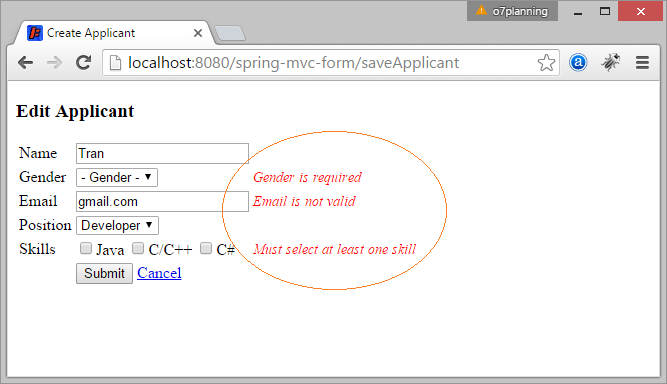
ApplicantValidator.java
package org.o7planning.springmvcforms.validator;
import org.apache.commons.validator.routines.EmailValidator;
import org.o7planning.springmvcforms.model.ApplicantInfo;
import org.springframework.stereotype.Component;
import org.springframework.validation.Errors;
import org.springframework.validation.ValidationUtils;
import org.springframework.validation.Validator;
@Component
public class ApplicantValidator implements Validator {
// common-validator library.
private EmailValidator emailValidator = EmailValidator.getInstance();
// The classes is supported to Validate
@Override
public boolean supports(Class<?> clazz) {
return clazz == ApplicantInfo.class;
}
@Override
public void validate(Object target, Errors errors) {
ApplicantInfo applicantInfo = (ApplicantInfo) target;
// Check the fields of ApplicantInfo.
// (See more in property file: messages/validator.property)
ValidationUtils.rejectIfEmptyOrWhitespace(errors, "name", "NotEmpty.applicantForm.name");
ValidationUtils.rejectIfEmptyOrWhitespace(errors, "email", "NotEmpty.applicantForm.email");
ValidationUtils.rejectIfEmptyOrWhitespace(errors, "position", "NotEmpty.applicantForm.position");
ValidationUtils.rejectIfEmptyOrWhitespace(errors, "gender", "NotEmpty.applicantForm.gender");
if(!emailValidator.isValid(applicantInfo.getEmail())) {
// Error in email field.
errors.rejectValue("email", "Pattern.applicantForm.email");
}
if(applicantInfo.getSkills()== null || applicantInfo.getSkills().length==0 ) {
errors.rejectValue("skills", "Select.applicantForm.skills");
}
}
}The error messages are configured in the messages/validator.properties file:
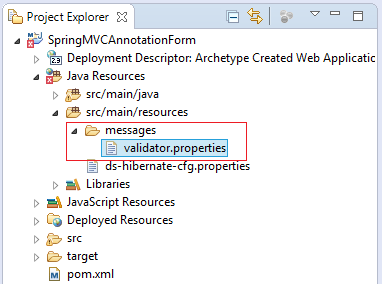
messages/validator.properties
NotEmpty.applicantForm.name=Name is required
NotEmpty.applicantForm.email=Email is required
NotEmpty.applicantForm.position=Position is required
NotEmpty.applicantForm.gender=Gender is required
Pattern.applicantForm.email=Email is not valid
Select.applicantForm.skills=Must select at least one skillThe content of validator.properties loaded by ApplicationContextConfig:
** ApplicationContextConfig.java **
// Load property in message/validator.properties
@Bean
public ResourceBundleMessageSource messageSource() {
ResourceBundleMessageSource rb = new ResourceBundleMessageSource();
// Load property in message/validator.properties
rb.setBasenames(new String[] { "messages/validator"});
return rb;
}8. Spring Controller
MyController.java
package org.o7planning.springmvcforms.controller;
import java.util.ArrayList;
import java.util.LinkedHashMap;
import java.util.List;
import java.util.Map;
import org.o7planning.springmvcforms.dao.ApplicantDAO;
import org.o7planning.springmvcforms.model.ApplicantInfo;
import org.o7planning.springmvcforms.validator.ApplicantValidator;
import org.springframework.beans.factory.annotation.Autowired;
import org.springframework.stereotype.Controller;
import org.springframework.transaction.annotation.Transactional;
import org.springframework.ui.Model;
import org.springframework.validation.BindingResult;
import org.springframework.validation.annotation.Validated;
import org.springframework.web.bind.WebDataBinder;
import org.springframework.web.bind.annotation.InitBinder;
import org.springframework.web.bind.annotation.ModelAttribute;
import org.springframework.web.bind.annotation.RequestMapping;
import org.springframework.web.bind.annotation.RequestMethod;
import org.springframework.web.bind.annotation.RequestParam;
import org.springframework.web.servlet.config.annotation.EnableWebMvc;
import org.springframework.web.servlet.mvc.support.RedirectAttributes;
@Controller
// Enable Hibernate Transaction.
@Transactional
// Need To use RedirectAttributes
@EnableWebMvc
public class MyController {
@Autowired
private ApplicantDAO applicantDAO;
@Autowired
private ApplicantValidator applicantValidator;
@RequestMapping("/")
public String homePage(Model model) {
return applicantList(model);
}
@RequestMapping("/applicantList")
public String applicantList(Model model) {
List<ApplicantInfo> list = applicantDAO.listApplicantInfos();
model.addAttribute("applicantInfos", list);
return "applicantList";
}
private Map<String, String> dataForPositions() {
Map<String, String> positionMap = new LinkedHashMap<String, String>();
positionMap.put("Developer", "Developer");
positionMap.put("Leader", "Leader");
positionMap.put("Tester", "Tester");
return positionMap;
}
private List<String> dataForSkills() {
List<String> list = new ArrayList<String>();
list.add("Java");
list.add("C/C++");
list.add("C#");
return list;
}
private String formApplicant(Model model, ApplicantInfo applicantInfo) {
model.addAttribute("applicantForm", applicantInfo);
Map<String, String> positionMap = this.dataForPositions();
model.addAttribute("positionMap", positionMap);
List<String> list = dataForSkills();
model.addAttribute("skills", list);
if (applicantInfo.getId() == null) {
model.addAttribute("formTitle", "Create Applicant");
} else {
model.addAttribute("formTitle", "Edit Applicant");
}
return "formApplicant";
}
@RequestMapping("/createApplicant")
public String createApplicant(Model model) {
ApplicantInfo applicantInfo = new ApplicantInfo();
return this.formApplicant(model, applicantInfo);
}
@RequestMapping("/editApplicant")
public String editApplicant(Model model, @RequestParam("id") String id) {
ApplicantInfo applicantInfo = null;
if (id != null) {
applicantInfo = this.applicantDAO.findApplicantInfo(id);
}
if (applicantInfo == null) {
return "redirect:/applicantList";
}
return this.formApplicant(model, applicantInfo);
}
@RequestMapping("/deleteApplicant")
public String deleteApplicant(Model model, @RequestParam("id") String id) {
if (id != null) {
this.applicantDAO.deleteApplicant(id);
}
return "redirect:/applicantList";
}
// Set a form validator
@InitBinder
protected void initBinder(WebDataBinder dataBinder) {
// Form target
Object target = dataBinder.getTarget();
if (target == null) {
return;
}
System.out.println("Target=" + target);
if (target.getClass() == ApplicantInfo.class) {
dataBinder.setValidator(applicantValidator);
}
}
// Save or update Applicant
// 1. @ModelAttribute bind form value
// 2. @Validated form validator
// 3. RedirectAttributes for flash value
@RequestMapping(value = "/saveApplicant", method = RequestMethod.POST)
public String saveApplicant(Model model, //
@ModelAttribute("applicantForm") @Validated ApplicantInfo applicantInfo, //
BindingResult result, //
final RedirectAttributes redirectAttributes) {
if (result.hasErrors()) {
return this.formApplicant(model, applicantInfo);
}
this.applicantDAO.saveApplicant(applicantInfo);
// Important!!: Need @EnableWebMvc
// Add message to flash scope
redirectAttributes.addFlashAttribute("message", "Save Applicant Successful");
return "redirect:/applicantList";
}
}9. JSP files
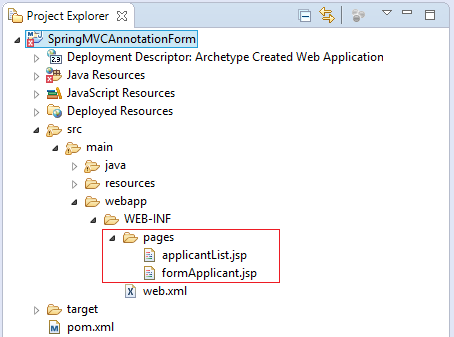
WEB-INF/pages/applicantList.jsp
<%@ taglib uri="http://java.sun.com/jsp/jstl/core" prefix="c" %>
<!DOCTYPE html>
<html>
<head>
<meta http-equiv="Content-Type" content="text/html; charset=UTF-8">
<title>Applicant List</title>
<style>
table {
margin-top: 10px;
border: solid black 1px;
}
table td {
padding: 5px;
}
.message {
font-size:90%;
color:blue;
font-style:italic;
margin-top:30px;
}
</style>
</head>
<body>
<a href="${pageContext.request.contextPath}/createApplicant">Create Applicant</a>
<br/>
<table border="1">
<tr>
<th>Name</th>
<th>Position</th>
<th>Gender</th>
<th>Email</th>
<th>Skills</th>
<th>Edit</th>
<th>Delete</th>
</tr>
<c:forEach items="${applicantInfos}" var="info">
<tr>
<td> ${info.name} </td>
<td> ${info.position} </td>
<td> ${info.gender} </td>
<td> ${info.email} </td>
<td> ${info.skillsString} </td>
<td> <a href="deleteApplicant?id=${info.id}">Delete</a> </td>
<td> <a href="editApplicant?id=${info.id}">Edit</a> </td>
</tr>
</c:forEach>
</table>
<c:if test="${not empty message}">
<div class="message">${message}</div>
</c:if>
</body>
</html>WEB-INF/pages/formApplicant.jsp
<%@ taglib uri="http://java.sun.com/jsp/jstl/core" prefix="c"%>
<%@ taglib prefix="spring" uri="http://www.springframework.org/tags"%>
<%@ taglib prefix="form" uri="http://www.springframework.org/tags/form"%>
<!DOCTYPE html>
<html>
<head>
<meta http-equiv="Content-Type" content="text/html; charset=UTF-8">
<title>Create Applicant</title>
<style>
.error-message {
color: red;
font-size:90%;
font-style: italic;
}
</style>
</head>
<body>
<h3>${formTitle}</h3>
<form:form action="saveApplicant" method="POST"
modelAttribute="applicantForm">
<form:hidden path="id" />
<table>
<tr>
<td>Name</td>
<td><form:input path="name" /></td>
<td><form:errors path="name"
class="error-message" /></td>
</tr>
<tr>
<td>Gender</td>
<td><form:select path="gender">
<form:option value="" label="- Gender -" />
<form:option value="M" label="Male" />
<form:option value="F" label="Female" />
</form:select></td>
<td><form:errors path="gender" class="error-message" /></td>
</tr>
<tr>
<td>Email</td>
<td><form:input path="email" /></td>
<td><form:errors path="email" class="error-message" /></td>
</tr>
<tr>
<td>Position</td>
<td><form:select path="position">
<form:options items="${positionMap}" />
</form:select></td>
<td><form:errors path="position" class="error-message" /></td>
</tr>
<tr>
<td>Skills</td>
<td><c:forEach items="${skills}" var="skill">
<form:checkbox path="skills" value="${skill}" label="${skill}" />
</c:forEach></td>
<td><form:errors path="skills" class="error-message" /></td>
</tr>
<tr>
<td> </td>
<td><input type="submit" value="Submit" />
<a href="${pageContext.request.contextPath}/applicantList">Cancel</a>
</td>
<td> </td>
</tr>
</table>
</form:form>
</body>
</html>Spring MVC Tutorials
- Spring Tutorial for Beginners
- Install Spring Tool Suite for Eclipse
- Spring MVC Tutorial for Beginners - Hello Spring 4 MVC
- Configure Static Resources in Spring MVC
- Spring MVC Interceptors Tutorial with Examples
- Create a Multiple Languages web application with Spring MVC
- Spring MVC File Upload Tutorial with Examples
- Simple Login Java Web Application using Spring MVC, Spring Security and Spring JDBC
- Spring MVC Security with Hibernate Tutorial with Examples
- Spring MVC Security and Spring JDBC Tutorial (XML Config)
- Social Login in Spring MVC with Spring Social Security
- Spring MVC and Velocity Tutorial with Examples
- Spring MVC and FreeMarker Tutorial with Examples
- Use Template in Spring MVC with Apache Tiles
- Spring MVC and Spring JDBC Transaction Tutorial with Examples
- Use Multiple DataSources in Spring MVC
- Spring MVC and Hibernate Transaction Tutorial with Examples
- Spring MVC Form Handling and Hibernate Tutorial with Examples
- Run background scheduled tasks in Spring
- Create a Java Shopping Cart Web Application using Spring MVC and Hibernate
- Simple CRUD example with Spring MVC RESTful Web Service
- Deploy Spring MVC on Oracle WebLogic Server
Show More
